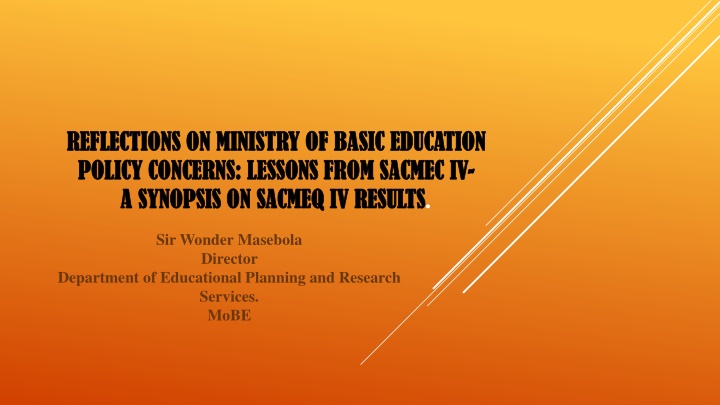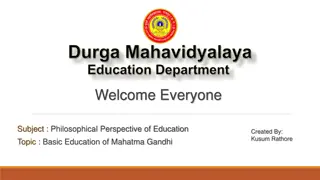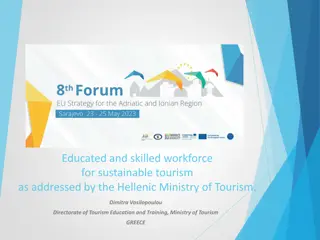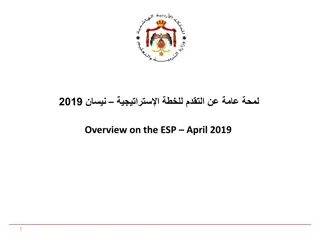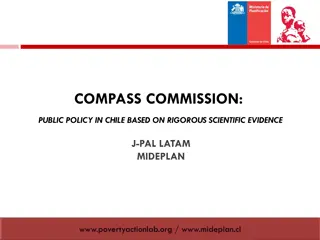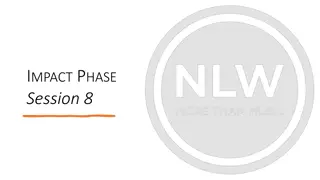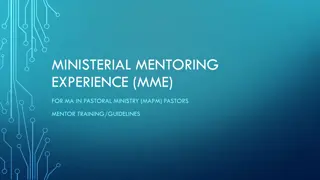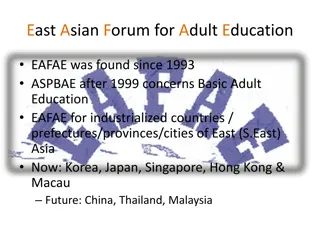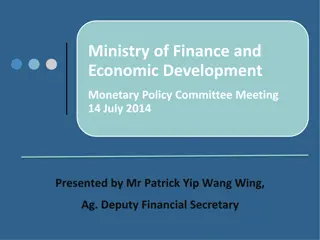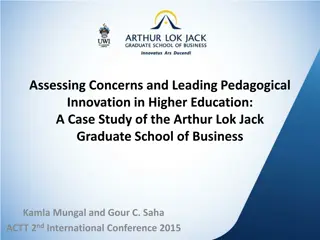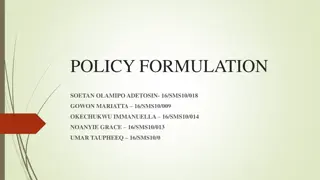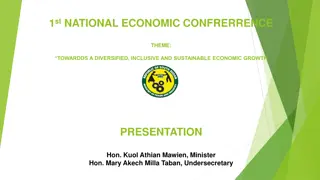Insights from SACMEQ IV Study on Ministry of Basic Education Policy Concerns
This article delves into the key findings of the SACMEQ IV study conducted in 2013 regarding the quality of education in Southern and Eastern Africa. It highlights the objectives of SEACMEQ, the sampling methods used, and the data collection instruments employed. The study focused on aspects such as general schooling conditions, reading and math achievements of Grade 6 learners, and knowledge about HIV and AIDS among learners and teachers.
Download Presentation

Please find below an Image/Link to download the presentation.
The content on the website is provided AS IS for your information and personal use only. It may not be sold, licensed, or shared on other websites without obtaining consent from the author.If you encounter any issues during the download, it is possible that the publisher has removed the file from their server.
You are allowed to download the files provided on this website for personal or commercial use, subject to the condition that they are used lawfully. All files are the property of their respective owners.
The content on the website is provided AS IS for your information and personal use only. It may not be sold, licensed, or shared on other websites without obtaining consent from the author.
E N D
Presentation Transcript
REFLECTIONS ON MINISTRY OF BASIC EDUCATION REFLECTIONS ON MINISTRY OF BASIC EDUCATION POLICY CONCERNS: LESSONS FROM SACMEC IV POLICY CONCERNS: LESSONS FROM SACMEC IV- - A SYNOPSIS ON SACMEQ IV RESULTS A SYNOPSIS ON SACMEQ IV RESULTS. Sir Wonder Masebola Director Department of Educational Planning and Research Services. MoBE
BACKGROUND FOR SEACMEQ The Southern and Eastern Africa Consortium for Monitoring Educational Quality (SEACMEQ), formerly SACMEQ is a non-profit organization.
OBJECTIVES FOR SEACMEQ The Objectives of SEACMEQ are to build capacity of its members to monitor and evaluate the quality of education, To use research to generate information that can be used to improve the quality of education To use innovative information sharing approaches to disseminate SEACMEQ results and to ensure that SEACMEQ results form the basis for policy and practice.
INTRODUCTION SEACMEQ Consortium has conducted four large-scale cross-national studies on the conditions of schooling and the quality of education in Southern and Eastern Africa namely; SACMEQ I, II, III and IV.
SACMEQ IV STUDY SACMEQ IV study data collection was conducted in 2013. a) The purpose of the project was to gather information on General conditions of schooling, b) Reading and mathematics achievement levels of Grade 6 learners and their teachers, and c) Knowledge that learners and their teachers have about HIV and AIDS.
SAMPLING & PARTICIPATION Two stage sampling design used; a) Probability-Proportional-to-Size (sampling of Schools based on size of region). b) Simple Random Sampling of learners using Computer- generated random numbers. Participating in SACMEQ IV study were; 4562 standard 6 pupils 435 of their teachers 188 school heads.
INSTRUMENTS Data collection instruments included; a) School Head Booklets, b) School Information Booklets, c) Teacher Booklets, d) Pupil Booklets e) Pupil Name Forms and f) School Forms.
FINDINGS Discussion of the findings are based on the following; TRENDS IN ACHIEVEMENT LEVELS OF STANDARD 6 PUPILS IN BOTSWANA ACCESS TO LEARNING MATERIALS IN BOTSWANA PRIMARY SCHOOLS PUPILS AND TEACHER KNOWLEDGE ABOUT HIV AND AIDS IN BOTSWANA BREAKFAST & SUPPER PATTERNS
Figure 1a: Botswana Pupil Mean Reading Score 580 570 560 550 540 567 530 520 535 510 521 500 490 SACMEQ II SACMEQ III SACMEQ IV
Figure 1b: Pupil Mean Reading Score by Country 700.0 600.0 609 588 577 570 567 538 538 500.0 532 526 512 511 508 485 458 456 400.0 300.0 200.0 100.0 0.0
FINDINGS Pupils reading scores increased by 14 points between SACMEQ II and SACMEQ III. Between SACMEQ III and SACMEQ IV pupil reading scores increased by 32 points. Botswana was 35 points above the SACMEQ mean
Reading skill levels 2007 2013 Change Level Description Pre Reading Skill/Competence % 2.9 % 2.0 % 1 Matches words and pictures involving concrete concepts and everyday objects Matches words and pictures involving prepositions and abstract concepts Interprets meaning (by matching words and phrases, completing sentences). Reads to link and interpret information located in various parts of the text Interprets information from various parts of the text in association with external information Reads to combine information from various parts of the text so as to infer the writer's purpose Locates information in longer texts (narrative, document or expository) in order to combine information from various parts of the text so as to infer the writer's personal beliefs (value systems, prejudices and biases). Reads from various parts of the text so as to infer and evaluate what the writer has assumed about both the topic and the characteristics of the reader -0.9 2 Emergent Reading 7.7 5.0 -2.7 3 Basic Reading 13.6 8.1 -5.5 4 Reading for Meaning 19.2 16.5 -2.7 5 Interpretive Reading 20.7 20.2 -0.5 6 Inferential Reading 16.5 17.2 +0.7 7 Analytical Reading 13.7 20.4 +6.7 8 Critical Reading 5.8 10.6 +4.8
FINDINGS Majority of the pupils reached reading competency levels 5 (20.2%) and level 7 (20.4 %). Noted increases for level 6,7 & 8. However, a substantial 15.1 % of standard 6 pupils are still at elementary reading competency levels (1-3).
Figure 2a: Botswana Pupil Mean Mathematics Scores 570 560 550 540 530 563 520 510 521 513 500 490 480 SACMEQ II SACMEQ III SACMEQ IV
Figure 2b: Pupil Mean Mathematics Scores by country 700.0 644 600.0 608 599 578 563 552 542 500.0 524 523 522 514 505 499 479 477 400.0 300.0 200.0 100.0 0.0
FINDINGS Pupil mathematics scores increased by 8 points and 42 points between SACMEQ II and SACMEQ III and between SACMEQ III and SACMEQ IV respectively. Botswana was 21 points above the SACMEQ IV mean of 542 points.
Mathematics skill levels 2007 2013 Change Level Description 1 Pre Numeracy Skill/Competence % % % 1.5 20.9 1.2 11.5 -0.3 -9.4 Applies single step addition and subtraction 2 Emergent Numeracy Applies a two-step addition and subtraction involving carrying Translates verbal information into arithmetic operations 34.0 22.6 -11.4 3 Basic Numeracy 27.2 28.0 +0.8 4 Beginning Numeracy Translates verbal or graphic information into simple arithmetic problems 9.2 20.1 +10.9 5 Competent Numeracy Translates verbal, graphic or tabular information into an arithmetic form in order to solve a given problem 6.0 10.7 +4.7 6 Mathematically Skilled Solves multiple operation problems (using the correct order) involving fractions, ratios and decimals 0.9 4.5 +3.6 7 Concrete Problem Solving Extracts and converts information from tables, charts and other symbolic presentations in order to identify, and then solve multi -step problems 0.4 1.4 +1 8 Abstract Problem Solving Identifies the nature of an unstated mathematical problem embedded information and then translate this into symbolic, algebraic or equation form in order to solve a problem within verbal or graphic
FINDINGS Majority of standard 6 pupils reached level 3, 4 & 5. 35.3% of standard 6 pupils are at elementary levels (1-3) for mathematics.
Figure 3a: Percentages of Standard 6 Pupils who responded with 'I use Mathematics Textbook by myself' in Botswana 100 90 80 70 60 50 80 40 72 62 59 59 58 30 54 50 43 42 41 38 20 34 30 40 26 24 23 10 0 NATIONAL BENCHMARK IS 100%
Figure 3b: Percentage of Standard 6 Pupils who responded with I use Reading Textbookby myself in Botswana 100 80 60 79 40 64 64 61 55 54 49 48 45 45 44 43 42 39 38 20 35 34 34 0 NATIONAL BENCHMARK IS 100%
FINDINGS Percentage of standard 6 pupils who responded with I use Mathematics textbook by myself has decreased from 80 % in the year 2000 to 62 % and 42% in the years 2007 and 2013 respectively. Percentage of pupils who responded with I use a reading textbook by myself was 79 %, 64 % and 45 % in the year 2000, 2007 and 2013.
Table 1 : Pupil and Teacher Scores on the SACMEQ HIV/AIDS Knowledge Test (HAKT) PUPILS TEACHERS Reached Minimal Level (%) 59 848 HAKT Score HAKT Score Reached Minimal Level (%) 100 Botswana: South East 561 Botswana: Gaborone 550 53 857 100 Botswana: North East 534 50 816 100 Botswana: Chobe Botswana: Kweneng 529 505 38 32 874 839 100 100 Botswana: Central Botswana: Kgatleng Botswana: North West 501 492 487 31 31 27 830 829 862 100 100 100 Botswana: South Botswana: Kgalagadi 471 467 21 19 830 838 100 100 Botswana: Gantsi BOTSWANA 455 508 15 35 831 837 100 100
Figure 4: Pupil HAKT transformed scores by country 600.0 500.0 534 526 517 515 507 490 484 483 477 475 473 471 445 441 400.0 413 300.0 200.0 100.0 0.0
FINDINGS Standard 6 pupil national score is at 508 while the minimum knowledge level is at 35%. This is worrisome because all pupils at standard 6 are expected to at least have minimal knowledge on matters related to HIV/AIDS. Standard 6 pupils are taught by teachers with national score of 837 and minimum knowledge level of 100%.
Figure 5a: Standard six pupils in Botswana who receive morning meal (%) 80 76 70 60 50 40 30 20 21 2 1 10 0 Not at all 1 or 2 per week 3 or 4 per week Everyday of the week
Figure 5b: Standard six pupils in Botswana who receive supper (%) 90 80 82.9 70 60 50 40 30 20 0.9 1.5 14.8 10 0 Not at all 1 or 2 per week 3 or 4 per week Everyday of the week
FINDINGS 76 % of standard 6 pupils in Botswana said they do not receive breakfast. 82.9 % of standard 6 pupils in Botswana do not receive supper. NB: This was not about schools providing meals to pupils but about pupils getting meals from any source.
SUMMARY & CONCLUSIONS Botswana was above SACMEQ IV mean in ALL achievement tests (Numeracy, Literacy & HIV/AIDS). A substantial percentage of standard 6 pupils in Botswana are concentrated within elementary levels of mathematics and reading. Standard 6 pupils who fall within elementary levels, particularly those in level 1 can hardly read and write without assistance and can only apply single step addition and subtraction.
SUMMARY & CONCLUSIONS Cont.., The percentages of pupils who own textbook have been declining since 2000 to a lower percentage until the year 2013 and this inevitably affect learning and teaching of our pupils. Pupils are taught by teachers who have displayed high HIV/AIDS knowledge levels yet Standard 6 pupils have unsatisfactory HIV/AIDS knowledge levels. Over 75% of STD 6 pupils in Botswana do not receive/eat breakfast, over 80% of STD pupils 6 do not receive supper.
RECOMMENDATIONS Department of Curriculum Development and Evaluation should consider developing teaching and learning materials that can enhance literacy and numeracy from lower levels. Ministry of Basic Education should ensure availability of funds for pupil textbooks; timely procurement and distribution of textbooks for all subjects to schools, and issuance of such to pupils. MoBE in collaboration with MLGRD should expedite provision of second meal at primary.
RECOMMENDATIONS Department of Basic Education should expedite the implementation of remedial programme at primary schools Ref. RNPE 1994 and the 2020 ETSSP. MoTE in collaboration with local universities should consider developing short courses programmes which teachers could enrol in to upgrade themselves to help them keep abreast with emerging issues in education
END THANK YOU
